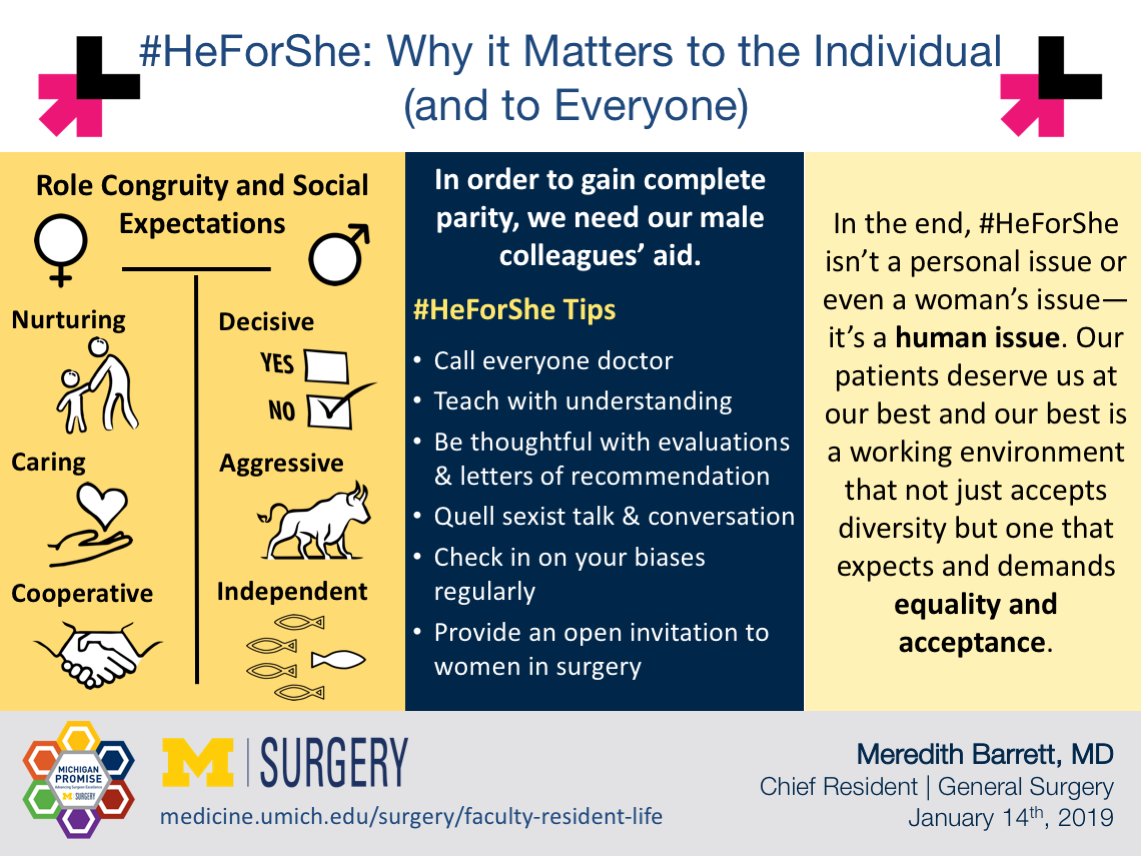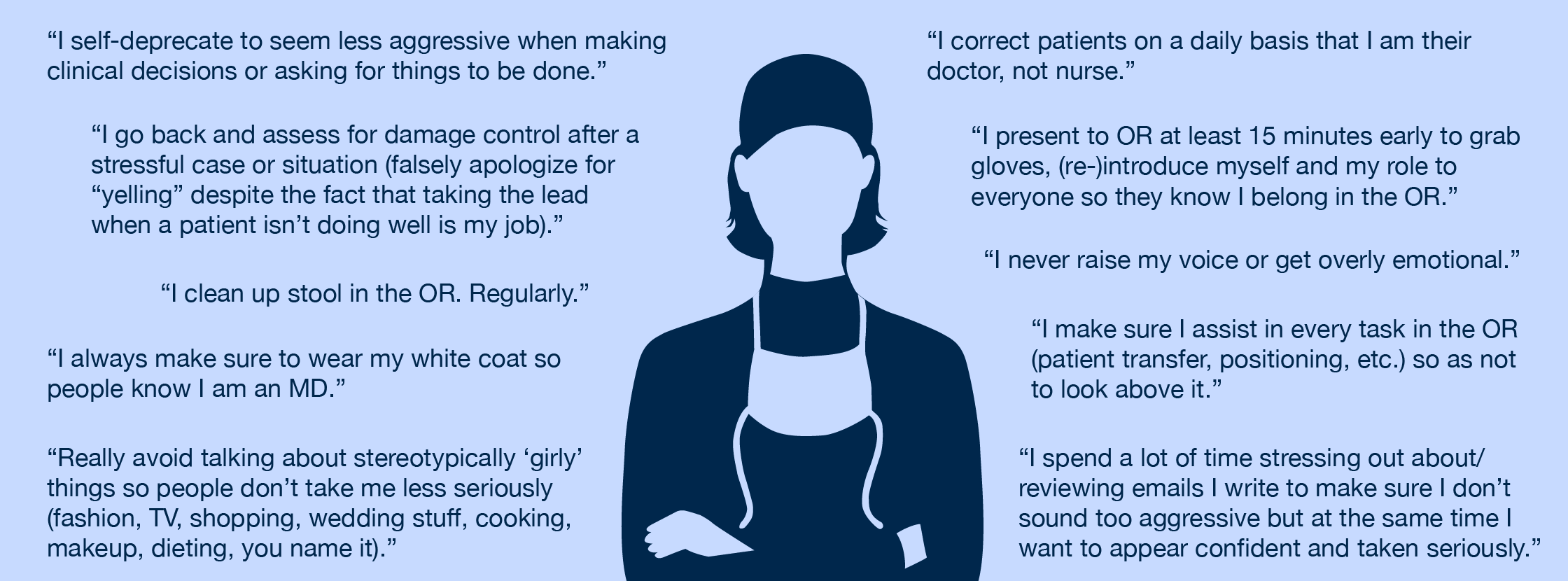

At the MSWC conference this past November, I was asked to discuss why #HeForShe matters to the individual, as a woman in surgery. As a woman in surgery, putting words to the experiences so ingrained in my daily life was a daunting task, but below is my perspective on this complex issue.
#HeForShe & Surgery
#HeForShe—a commitment by men to ally with women against gender bias and disparity—matters to the individual (and all of us) because we want to be part of an academic institution that celebrates, promotes, and expects equity and diversity for our providers. Working in a diverse team reflective of the patients we care for is imperative for optimal patient outcomes. Yet, despite great strides, we have yet to reach equity for women in surgery1. Study after study shows that women are less likely to be promoted, receive harsher evaluations, and receive less flattering recommendations than their male counterparts2.
The explanation for this problem is obviously multifactorial, but one theory frequently noted in the literature is that of role congruity—and the consequences of opposing that congruity. Although we have made great advances in gender equality, there are still societal beliefs and stereotypes about women and men--particularly that women should act communally (nurturing, caring, and cooperative) while men are agentic (decisive, assertive, independent). Classically surgeons are praised for and expected to display agentic qualities. So, what is the result when a woman enters an agentic field-like surgery? To be successful, she may defy role congruity and social expectations—but adopting traditionally “agentic” traits may cost her social capital. In fact, there is robust literature confirming women are often liked when they display communal qualities and respected when they display agentic qualities3. In fields like surgery, this often becomes an “either/or” for women, either be liked or be respected. In contrast, men may not have to sacrifice one for the other.
To reinforce this evidence with personal experiences, I polled my co-residents, asking them what strategies they use to manage their role as a woman in surgery and gain respect. Their responses were resounding and passionate. In all facets of their day, female surgery residents carefully adjusted their actions, words, and body language to navigate a system historically tailored to men.

Sample Female Surgery Resident Responses
- “Really avoid talking about stereotypically “girly” things so people don’t take me less seriously (fashion, TV, shopping, wedding stuff, cooking, makeup, dieting, you name it).”
- “I clean up stool in the OR. Regularly.”
- “I make sure I assist in every task in the OR (patient transfer, positioning, etc.) so as not to look above it.”
- “I always make sure to wear my white coat so people know I am an MD.”
- “I go back and assess for damage control after a stressful case or situation (falsely apologize for “yelling” despite the fact that taking the lead when a patient isn’t doing well is my job).”
- “I spend a lot of time stressing out about/reviewing emails I write to make sure I don’t sound too aggressive but at the same time I want to appear confident and taken seriously.”
- “I self-deprecate to seem less aggressive when making clinical decisions or asking for things to be done.”
- “I correct patients on a daily basis that I am their doctor, not nurse.”
- “I present to OR at least 15 minutes early to grab gloves, (re-)introduce myself and my role to everyone so they know I belong in the OR.”
- “I never raise my voice or get overly emotional.”
From taking extra time socializing with nurses and performing superfluous tasks to build goodwill, scrutinizing emails to ensure they were not too aggressive, to regularly correcting patients that they are their doctor, not their nurse. Absorbing the sheer amount of emotional labor represented on that list was exhausting, and it was only from a small sampling of the resident population. Clearly these experiences shape our trainees. This extra “editing” of a resident’s authentic self takes additional mental energy, and this can lead to burn out, career dissatisfaction and limit promotion ability.
#HeForShe Tips
The research that went into investigating why #HeForShe matters to women in surgery uncovered a lot of biases and challenges for women in our field. Though we are making great strides, in order to gain complete parity, we need our male colleagues' aid.
Here are a few #HeForShe tips to keep in mind:
- Call everyone doctor—we have all earned the title, please use it Just because everyone assumes you’re a doctor doesn’t mean everyone assumes I am
- Teach with understanding—not every woman feels the pressure to be communal but recognize a lot of us do, many of us have been trained and praised for avoiding aggressiveness. Do not assume lack of assertiveness is incompetence
- Be thoughtful with evaluations and letters of recommendation—research has found that letters of recommendation for men are more likely to include accomplishments whereas letters for women often highlight their personal life. Women are more likely to receive negative feedback on evaluations whereas men garner constructive criticism.
- Quell sexist talk and conversation—there is no place for such dialogue
- Check in on your biases regularly—we must put forth effort to bring our implicit biases into our explicit thoughts. It is only when you recognize these biases that you can combat them
- Provide an open invitation to women—women have been asked to modify their personality to make those around them feel comfortable. Men have been granted a wider lane with regard to their actions and personalities where women seem to be accepted on much narrower terms. The invitation for women must be an open one if we are to reap the full benefits of inclusion
#HeForShe matters to the individual, but it is not an individual issue. In the end, #HeForShe isn’t a personal issue or even a woman’s issue—it’s a human issue. Our patients deserve us at our best and our best is a working environment that not just accepts diversity but one that expects and demands equality and acceptance.
- Abelson JS, Chartrand G, Moo TA, Moore M, Yeo H. The climb to break the glass ceiling in surgery: trends in women progressing from medical school to surgical training and academic leadership from 1994 to 2015. Am J Surg. 2016;212(4): 566-572.e561.
- Snyder K. The Abrasiveness Trap: high achieving men and women are described differently in reviews. Fortune2014.
- Carnes M, Bartels CM, Kaatz A, Kolehmainen C. Why is John More Likely to Become Department Chair Than Jennifer? Trans Am Clin Climatol Assoc. 2015;126: 197-214.
Article by Meredith Barrett, MD (Twitter: @sparklyscalpel)
Downloads

Meredith Barrett, MD
Contact Us
Reach out to join the conversation or to learn more about how to implement the Michigan Promise. Connect with the Department of Surgery or our faculty on Twitter to share your ideas or get in touch with the Office of Faculty & Resident Life to schedule a Michigan Promise presentation at your institution. You can also fill out our Michigan Promise Inquiry Form with any questions or comments.
Department of Surgery
2210F Taubman Center
1500 E. Medical Center Dr.
Ann Arbor, MI 48109
Phone: 734-232-5528
Email: [email protected]
Twitter: @UMichSurgery
Hashtag: #MichiganPromise
